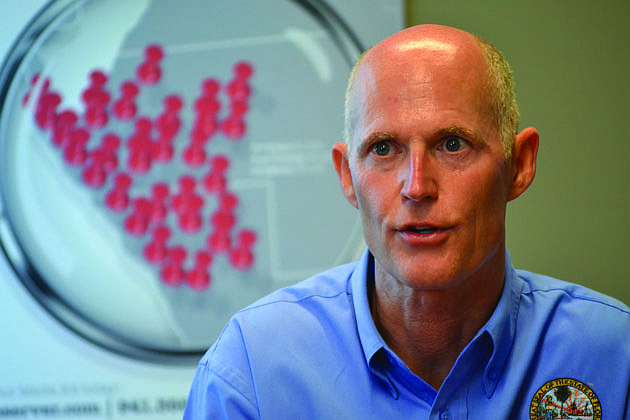- November 21, 2024
-
-
Loading

Loading

Florida Gov. Rick Scott believes the state's road to economic recovery depends upon the jobs he believes can be created the quickest — those in the hospitality and agriculture industries.
Scott, who met with the editorial board of the Business Review and its parent company, The Observer Group, on Monday at the company's downtown Sarasota office, said those two industries will be the driving forces in helping to pull the state out of an anticipated $1.3 billion shortfall this year.
The state had previously anticipated a $1.5 billion surplus after cutting the budget approximately $700 million last year.
“Tourism will continue to do well,” said Scott, who noted that the Florida Panhandle hotel bed-tax numbers were up 100% compared with a year ago, when the BP oil spill devastated the region and its tourism numbers. “There's no reason to expect the agriculture industry won't have a good year as well, and our ports have big opportunities.”
The elimination of a visa requirement for Brazilians, Scott said, will also help bring more tourism to the area.
Scott also intends to deliver on a campaign promise that involves bringing 700,000 jobs to Florida in seven years.
In a recently released statement, Scott said: “no matter what the economy might otherwise gain or lose,” his goal was always to create that many jobs.
“We are going to get there,” Scott told the Business Review. “We are adding 10,000 jobs a month right now in the private sector alone.”
Scott said the state and its economic leaders must do a better job of promoting the state and also realize that Florida is competing with other states for jobs.
The governor said he's not willing to lure companies to the state with promises of huge tax breaks if they can't deliver on their promise of jobs and economic growth to the state.
“We can't give tax breaks to companies unless we hold them accountable,” Scott said. “If they don't provide what they promised, they need to give the money back.”
Once the economy is more stable, Scott said he intends to reduce the state's business tax, property tax and intangible business tax before reducing the state's sales tax. Eliminating unnecessary regulations for businesses, Scott said, is also key.
When asked what his boldest, most controversial proposal he was likely to submit to the Legislature at its next session, Scott said he's frustrated with the state's education dollars and how they are disbursed.
Noting that more than 2,000 people make more than $144,000 a year in the state's higher education system, Scott said changes need to be made and that more Florida students need to attain science, technology, education and math degrees.
“If we are going to change this state, I will do everything I can to help our money go into those education sectors,” Scott said.
Scott said he also plans to address the backlog of foreclosures in the next session by considering the allowance of voluntary non-judicial foreclosures to speed up the process.
Scott also expressed frustration with Citizens Property Insurance, the state's insurer of last resort, and said residents are not aware it's underfunded by $18 billion.
When asked about his position on proposals for widening casino gambling in Florida, Scott said he would like the decision to be made at the local level.
“What I have said all along is I don't want to do this as a way to balance the budget,” Scott said.
Scott said he's not likely to commit to a Republican presidential candidate until the state's primary is held Jan. 31.
“It will come down to whom the American public believes can get jobs going again,” Scott said. “You can't solve anything until you get a job.”